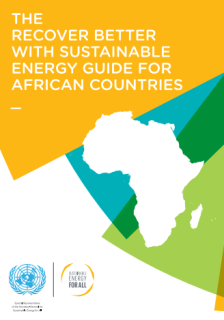
In Africa, it is estimated that 565 million people still lack access to electricity. Without electricity, they lack a basic necessity for poverty alleviation and the ability to build resilience to the global health crisis. To achieve universal electricity access in Africa by 2030, we estimate that an annual investment of about USD 29 billion in electricity infrastructure is required, both for on-grid and off-grid access.
There are an estimated 900 million people in Africa without access to solutions for clean cooking. The health impact of cooking with polluting fuels means increased risk of respiratory disease and vulnerability to COVID-19, and increased exposure to the virus through the collection of firewood and other fuels. An annual investment of about USD 2 billion in clean cooking solutions is required.
This sustainable energy guide highlights the opportunities, benefits and enablers that will help leaders guide their countries into a more sustainable long-term development trajectory. As African countries recover better, they can also lead by example by translating their recovery actions into updated Nationally Determined Contributions (NDCs) under the Paris Agreement.
